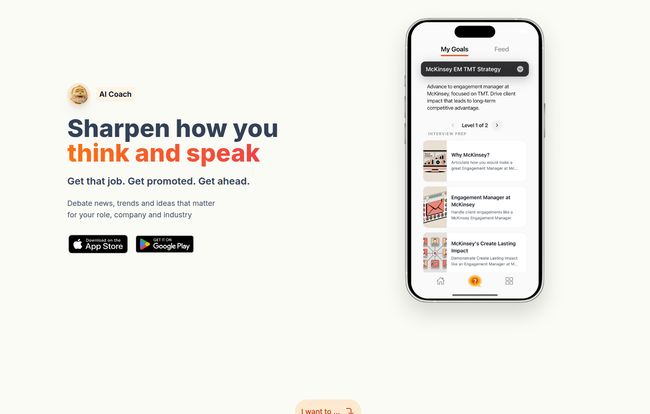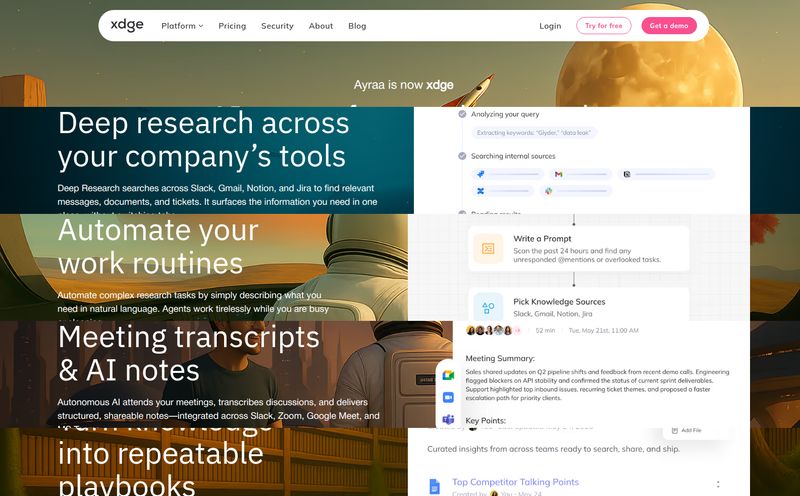We’ve all been there. You’re in a high-stakes meeting, or worse, a job interview. You have the perfect idea in your head, a brilliant, game-changing concept. But when you open your mouth to explain it, what comes out is... a jumbled mess. A word salad. You see the glazed-over eyes and you know you’ve lost them.
It’s a frustrating feeling. For years, the advice has been the same: “practice makes perfect.” Great. But practice with who? Your patient spouse? Your cat? They’re great listeners, sure, but their feedback on your Q3 growth strategy might be a bit lacking.
This is the exact gap a tool like Socratify is trying to fill. It popped up on my radar recently with a pretty bold claim: to be a “business school in your pocket.” As someone who's spent more years than I’d like to admit navigating the corporate jungle and optimizing everything from click-through rates to team communication, my curiosity was piqued. An AI coach designed to sharpen how I think and speak? Okay, I’m listening.
So, What Exactly is Socratify? (And Why the Greek Guy?)
At its core, Socratify isn't another news aggregator or a flashcard app. It’s an AI-powered sparring partner. The name itself is a huge clue—it’s built around the Socratic method. It’s not about spoon-feeding you information; it’s about challenging your assumptions and forcing you to defend your reasoning through AI-driven debates.
Think about their tagline: “Don’t just be informed. Be insightful.” That’s the whole ballgame right there. In our information-saturated world, knowing things is table stakes. The real value is in connecting the dots, forming a sharp opinion, and articulating it with confidence. That’s insight.
Socratify works by presenting you with real-world business stories and trends. Maybe it’s a piece on McKinsey’s latest report or a breakdown of a startup’s disruptive new model. Instead of just reading it, the AI coach engages you in a conversation. It asks probing questions. It challenges your viewpoint. It forces you to think on your feet, just like in a real boardroom.

Visit Socratify
Key Features That Stood Out
From what I've seen, the experience is built on a few core pillars. You get AI-driven debates to practice your argumentation. There's personalized feedback that, in theory, adapts to your specific goals, whether that’s nailing an interview or just sounding smarter in your next team sync. And it’s all fueled by curated business news, so you’re always discussing something relevant.
Who Is This AI Coach Really For?
I can see a few distinct profiles getting a ton of value from this. The website testimonials give a few clues. You've got your ambitious MBA student from a top school like Michigan Ross, likely using it to prep for those grueling case study interviews where “thinking beyond the headline” is the only way to get an offer.
Then there’s the Engagement Manager at McKinsey. This is someone who lives and breathes strategy and communication. For them, even 5 minutes of daily practice is like a mental warm-up, keeping their thinking sharp and their arguments tight. It's a whetstone for an already sharp mind.
But I don't think its limited to just consultants and B-school hopefuls. I see it as a tool for:
- Aspiring Managers: People transitioning from individual contributors to leaders who suddenly need to be much more strategic in their communication.
- Product Managers: Folks who constantly have to defend their roadmap and articulate complex user needs to different stakeholders.
- Sales Professionals: Anyone who needs to think on their feet, handle objections, and build a logical case for a product or service.
- Anyone who hates role-playing: Seriously. It provides a safe, non-judgmental space to practice tough conversations without the awkwardness of role-playing with a colleague.
My Experience: Putting the AI Sparring Partner to the Test
Okay, so I had to try it. Signing up was simple enough, with the standard Apple or Google login options. No friction there. I jumped into a discussion about a recent trend in the creator economy.
The AI didn't just ask “What do you think?” It posed a specific, debatable point. I typed out my response, trying to be as articulate as possible. The AI came back, not with a “good job!” but with a counterpoint. It was... interesting. It felt less like a test and more like a real, if slightly stilted, debate. It forced me to refine my initial point and think about the counter-arguments.
The feedback loop is immediate. There's no waiting for a mentor to email you back. It’s right there, instant analysis. This is where the concept of deliberate practice, famously talked about by James Clear, really comes into play. It’s not just mindless repetition; it’s targeted practice with immediate, actionable feedback. That's how you actually get better at something.
The Good, The Bad, and The AI
No tool is a silver bullet, and Socratify is no exception. After playing around with it, here's my breakdown of the highs and lows.
The Things I Genuinely Liked
The convenience is a massive plus. The idea of getting in a few reps of critical thinking while waiting for my coffee is powerful. It turns dead time into development time. I also appreciate its singular focus. It knows what it is: a tool for sharpening your mind and your mouth. It isn't trying to be a project management tool or a social network. This focus is refreshing.
But the biggest win, in my book, is that it forces active engagement. We passively consume so much content—articles, podcasts, videos. Socratify makes you an active participant. You can't just scroll; you have to think, type, and defend. That's a different muscle, and one that most of us don't exercise enough.
Where It Falls a Bit Short
Now, for the reality check. The biggest drawback is inherent in the technology. It's an AI. It can’t replicate the full spectrum of human interaction. It won't pick up on your tone, your hesitation, or the subtle non-verbal cues that are so important in real-world communication. It's a fantastic simulator, but it's still a simulation.
Furthermore, its effectiveness is entirely dependent on you, the user. It’s a gym membership for your brain—if you don't show up and do the work, you won’t see results. If you give lazy, one-sentence answers, you'll get lazy, generic challenges back. You have to bring your A-game to get real value out of it. There's also a question about the depth of its content library. Will the business stories start to feel repetitive after a few weeks? Only time will tell.
The Million-Dollar (Or is it Free?) Question
So what does this “business school in your pocket” cost? That’s the tricky part. As of my review, there’s no clear pricing page on their website. This often means a product is in a public beta, or they're using a freemium model where you can download and try it, with a subscription to unlock more advanced features. My best advice is to check its page on the Apple App Store or Google Play Store for the most current pricing information. It seems free to get started, which is always a good thing.
My Final Verdict: Is Socratify Worth Your Time?
So, should you download it?
If you're someone who is serious about your professional development and you recognize that strong communication and clear thinking are skills, not just talents, then yes. Absolutely. Give it a shot.
Think of Socratify not as a replacement for a human mentor or a real MBA program, but as a powerful supplement. It's the batting cage for your business brain. It's the daily drill that keeps you sharp for game day. It won't magically make you a CEO overnight, but it can absolutely help you articulate your ideas more clearly, build more logical arguments, and walk into your next big meeting with a little more confidence. And in today’s world, that’s a pretty significant edge.
Frequently Asked Questions About Socratify
- What is Socratify?
- Socratify is an AI-powered mobile app that acts as a business coach. It helps professionals improve their critical thinking and communication skills by engaging them in AI-driven debates about real-world business news and case studies.
- How does Socratify actually improve your communication skills?
- It works through a process of deliberate practice. By forcing you to articulate and defend your viewpoints on complex topics, it helps you structure your thoughts more logically. The instant feedback from the AI helps you identify weaknesses in your arguments, making you a more precise and persuasive communicator over time.
- Is Socratify free to use?
- Currently, it appears to be free to download and start using. It may operate on a freemium model, where advanced features or unlimited use could require a subscription. It's best to check the app's listing on the App Store or Google Play for the latest details.
- Can Socratify replace a real business coach or a mentor?
- Not entirely. While it's a fantastic tool for convenient, daily practice and provides instant feedback, it can't replace the nuanced, empathetic, and holistic guidance of an experienced human coach. It's best viewed as a powerful supplement to your professional development, not a complete replacement for human mentorship.
- Who would get the most benefit from using Socratify?
- Professionals in roles that require sharp analytical and communication skills would benefit most. This includes consultants, product managers, MBA students, aspiring leaders, and anyone preparing for interviews that involve case studies or strategic questions.
- How much time do I need to commit to see results?
- One of the main advantages is its flexibility. According to user testimonials, even just 5 to 10 minutes of focused practice each day can lead to noticeable improvements in how you structure and articulate your thoughts.
Reference and Sources
- Socratify Official Website: Not provided, but you can search for Socratify AI.
- Socratify on the Apple App Store
- Socratify on the Google Play Store
- Concept of Deliberate Practice: James Clear - "The Beginner's Guide to Deliberate Practice"



